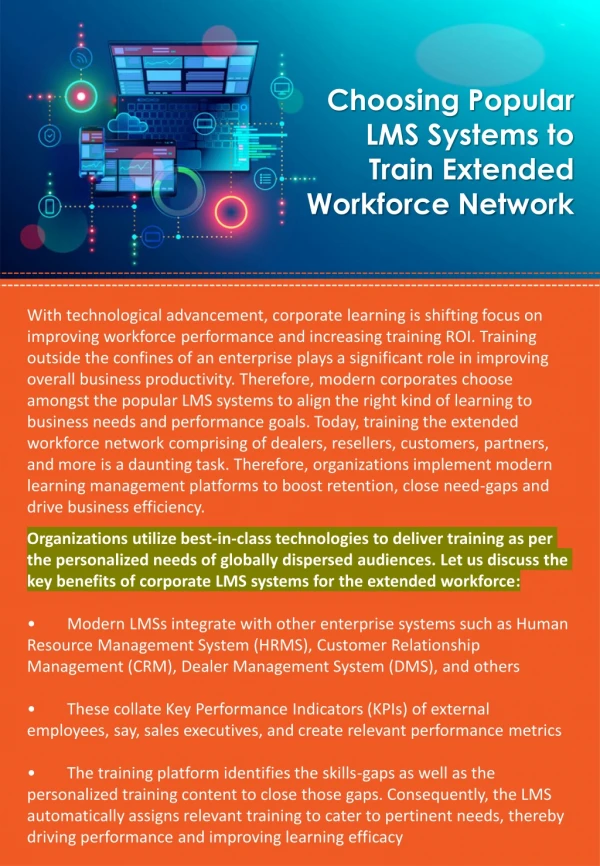Choosing Popular LMS Systems to Train Extended Workforce Network
With technological advancement, corporate learning is shifting focus on improving workforce performance and increasing training ROI. Training outside the confines of an enterprise plays a significant role in improving overall business productivity. Therefore, modern corporates choose amongst the popular LMS systems to align the right kind of learning to business needs and performance goals. Today, training the extended workforce network comprising of dealers, resellers, customers, partners, and more is a daunting task. Therefore, organizations implement modern learning management platforms to boost retention, close need-gaps and drive business efficiency. Organizations utilize best-in-class technologies to deliver training as per the personalized needs of globally dispersed audiences. Let us discuss the key benefits of corporate LMS systems for the extended workforce: u2022tModern LMSs integrate with other enterprise systems such as Human Resource Management System (HRMS), Customer Relationship Management (CRM), Dealer Management System (DMS), and others. u2022tThese collate Key Performance Indicators (KPIs) of external employees, say, sales executives, and create relevant performance metrics. u2022tThe training platform identifies the skills-gaps as well as the personalized training content to close those gaps. Consequently, the LMS automatically assigns relevant training to cater to pertinent needs, thereby driving performance and improving learning efficacy. u2022tThe new-age learners are more adept at learning on the go. They prefer accessing training content on their personalized mobile devices to learn at their own pace of time and convenience. Mobile LMSs allow learners to access short bursts of training modules, no matter where they are- at home, in office, or traveling. u2022tFor learners who are mostly on the go, extended training portals are available as custom mobile apps for Android and iOS platforms. Mobile learning supports easy navigation, facial recognition, social learning, scrolling, and other features. So, this leads to higher reach to the geographically spread workforce along with improving the overall learning uptake. u2022tModern e-learning platforms deliver experience-driven LMS solutions as per the personalized attributes- job roles, skills, KRAs, trends, or learning histories. Consequently, the external workforce can access the most relevant knowledge and apply it to real-life situations. u2022tThe powerful learning management platforms also support video streaming feature which allows managers to create short video nuggets for better engagement and retention levels. In a nutshell, popular LMS systems deliver personalized learning for both internal as well as the extended workforce. As a result, innovative LMS solutions helps to bridge performance-gaps, and boost learner engagement for greater accessibility, ROI, and overall impact. The robust extended LMSs aid organizations to develop a more competent workforce, thereby achieving training targets and staying competitive.
★
★
★
★
★
32 views • 2 slides

